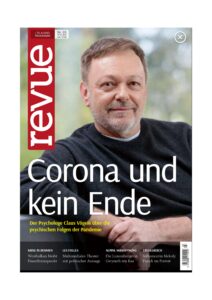Interview with Professor Claus Vögele for REVUE
In a recent interview that made the cover in Luxembourgish paper “Revue”, Prof. Claus Vögele assesses the current COVID-19 situation from his clinical psychological point of view.
Since early 2020, the world lives in what we call a “new normal”, but as Prof. Vögele underlines, it was not the world’s first pandemic, and surely won’t be the last. For some, work has drastically changed, with remote working and the pros and cons it entails; however, for some, it was already intrinsically part of the job. What was not part of the job, was the mental aspect and how it has affected us. And little things that did not bother us in the past, do now tenfold, like “under a magnifying glass” explains Prof. Vögele.
“Our thoughts hold the power to make us sick – or to heal us” says Prof. Claus Vögele.
Is positive thinking the key to dealing with all this? What about other worldwide issues such as climate change, which worries Prof. Vögele more than Covid-19 does.
Based on an international, ongoing survey of representative samples of people from 6 EU countries, the economic impact on individuals living in the Grand Duchy seems to have been moderate compared to its neighbours. Yet, despite a much higher quality of life, Luxembourg residents are more stressed about the situation than people in Spain, Italy or France. And why, you may ask? For Prof. Vögele, “Stability is crucial for Luxemburgish people, perhaps more so than for people living in other countries. Anything that shakes this stability becomes a source of stress”.
Insecurity and uncertainty about the future may have significantly contributed to increased self-reported depression, especially in young people, and also in elderly people in retirement homes. Students, especially international students, at the University were particularly affected, having to stay in their small studios or co-locations, unable to get out or to fly home. These issues were always there, says Prof. Vögele. Pandora’s box of increased psychological issues was already ajar, but now it’s wide open.
Following Prof. Vögele’s last words “Be careful but stay in touch with the world around you”.
Read the entire feature in REVUE’s latest publication: https://shop.revue.lu/index.php?route=product/product&path=1_44&product_id=730
